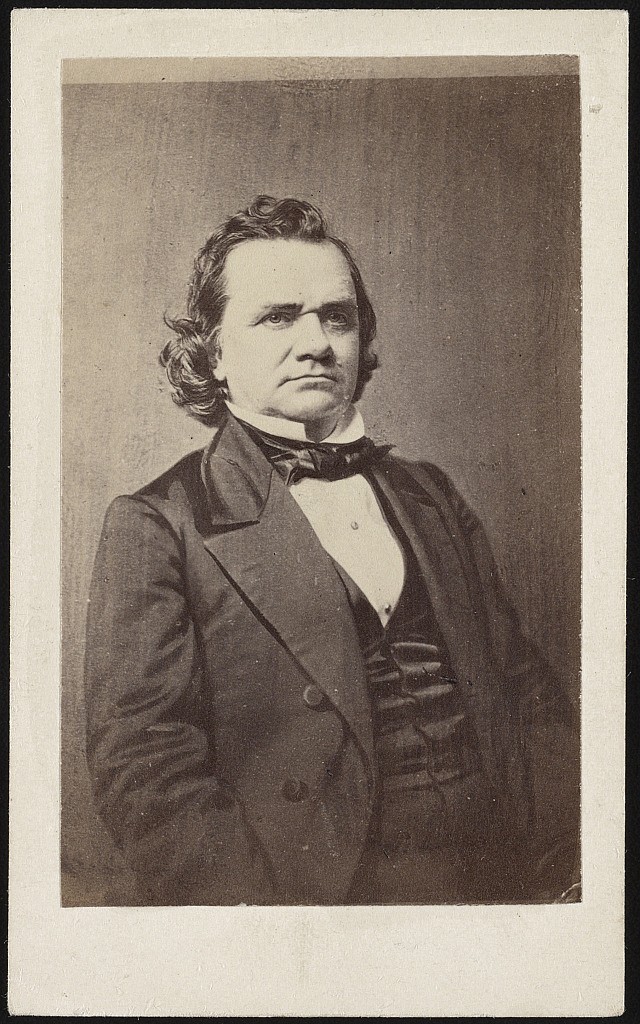The election of 1860 finally brought the issue of slavery before the American electorate. Abraham Lincoln and the new Republican Party opposed the expansion of slavery. But the Republican Party at that time was only a sectional party, and many states in the South, including Tennessee, did not have a Republican on the ballot. A new Constitutional Union Party, led by John Bell of Tennessee, vaguely promised to maintain the Constitution, the Union, and the laws -- essentially avoiding the issue.
A few months before the election, the Democratic Party, as a national institution, split over the issue, with Southern Democrats espousing an aggressive position on slavery, buttressed by the 1859 Dred Scott decision of the Supreme Court, which essentially held that Congress had no power to limit slavery in the territories. The Southern Democratic candidate was the sitting vice president, John C. Breckinridge.
The Northern Democrats were led by Stephen A. Douglas, known as "the Little Giant" because his political stature eclipsed his 5 feet 4 inches height. Douglas is best known today for his debates with Abraham Lincoln in connection with an Illinois Senate race in 1858. In 1860, Douglas advocated a doctrine of "popular sovereignty." Each state should decide whether to allow slavery or not by popular vote. Douglas stated "[t]he great principle is the right of every community to judge and decide for itself, whether a thing is right or wrong ... ."
In many ways, Douglas was the only candidate with strength in each region. Lincoln was ignored in the South, except as a perceived menace. Pro-slavery Breckinridge had no chance in the North. Bell's lukewarm message appealed to Tennessee and other border states, as they perhaps instinctively foresaw that they would be the primary battlegrounds in a civil war. But Douglas campaigned from Maine to Mobile and New Orleans, and preached a pro-Union message of moderation. At the end of October 1860, just a few days before the election, Douglas made a swing through Tennessee, Northern Alabama and Georgia, appearing in Chattanooga on Oct. 27.
The "Little Giant" arrived in Chattanooga from Nashville and was greeted by a huge crowd. The Athens Post's correspondent deemed it the largest crowd ever assembled in East Tennessee, "a great multitude who no man could number," although he estimated it at 8,000 people. He was greeted with the "wildest enthusiasm" and was escorted, with banners and music, to a stand built for his appearance.
Douglas spoke for an hour and a half, and his adherents deemed his speech "not only a successful vindication of his policy and the position he is occupying before the country, but the ablest elucidation of the question of slavery in the Territories ever made by any man." The Post's correspondent wrote that Douglas' "friends and supporters" in lower East Tennessee "have cause to be proud of the manner and magnitude of his reception" at Chattanooga, noting appreciation for his battle "against the Disunion element and Sectionalism in both divisions of the Union ... ." Even for those disposed by their politics to vote against him, "such an appeal as Judge Douglas made for the Union of our fathers will always strike a responsive chord in the breasts of the patriotic masses of East Tennessee, and receive their warmest approbation."
Douglas' valiant effort came to naught. Hamilton County voted 1,074 for Bell, 820 for Breckinridge, and only 165 for Douglas. Nationwide, Douglas polled well, garnering more votes than Breckinridge and Bell, and in fact almost polling better than the two of them combined. But in electoral votes, he finished last, with only 12, compared to Lincoln's victorious 180.
In the months afterward, the "Secession Winter" of 1860-1861, Douglas worked on every significant compromise effort to stave off civil war. He was still the most significant member of the Democratic Party in the North. While aspects of his past political conflict with Lincoln (each led a rival party) remained, Lincoln and Douglas maintained a good relationship, and Lincoln was said to confide in Douglas as no other Democrat. And, when war came after Fort Sumter, Douglas' focus was on Union victory.
Douglas did not survive to see that victory. Stricken by illness during a trip home to Illinois, he died on June 3, 1861, at age 48. At least some citizens of Hamilton County would have mourned him for his efforts to avoid the cataclysm on which the county, the state and the nation faced.
Local attorney and historian Sam Elliott is a member of the Tennessee Historical Commission. For more local history, visit Chattahistoricalassoc.org.
